THE Government has performed a u-turn over the deadline by which all bids on the New Providence renewable energy and microgrid project must be received, it can be revealed.
Documents obtained by Tribune Business disclose that, prior to the original March 28 deadline for all offers on the up to 100 Mega Watt (MW) initiative to be received, bidders were told that no extension would be granted.
One interested party, which asked if “an extension can be provided to the closing date (say, three weeks)”, was bluntly told by the Government and the Energy Committee overseeing the process: “The Government cannot provide an extension at this time.”
• Extends after initial date and turning down move
• Rejects process integrity fears on offer ‘modifying’
• Wants Bahamians to get majority equity in 3 years
The same document, which is a nine-page summary detailing all bidder questions and the Government’s replies, saw another group request the provision of an “updated timeline”. The Government’s response was: “The deadline for proposal submission is March 28, 2024.”
However, following the Easter weekend and after the March 28 deadline was passed, the Government changed
its stance and extended the bid deadline until next Friday, April 12, with all parties allowed to enter the Go Bonfire online procurement portal and “modify” their submissions.
Gilles Deal, the Government official acting as the contact point for the Request for Proposal (RFP) process, in a e-mailed message sent to all bidders after 5pm on Tuesday, April 2, wrote: “The Energy
NIB’s $240m loss at COVID’s peak
By NEIL HARTNELL
being tabled in the House of Assembly yesterday, revealed that the pandemic both accelerated and deepened its existing woes by causing the social security system to incur losses of $51.1m for that year following $188.6m worth of ‘red ink’ in 2020. The combined $239.7m loss, the report revealed, drove NIB’s reserve fund below the $1.5bn mark at year-end 2021 as a consequence of the surge
in unemployment and other benefits paid out to support jobless Bahamians and their families during the peak of COVID lockdowns and other restrictions. This marked a more than $200m drop from the $1.7bn-plus levels they had attained from 2017 to 2019.
The 2020 annual report, also tabled in Parliament yesterday, said that year saw “the largest gap between
Committee agreed that the date of closure and proposal due date be extended to April 12, 2024,


‘Public protest’ not enough to overturn planning approvals
• Wynn’s Goodman’s Bay penthouse ‘varied’ in verdict
• Site plan approval ‘preliminary’; must seek final nod
• But neighbour’s challenge rejected by Appeal Board
By NEIL HARTNELL
PLANNING authorities yesterday modified the approvals granted to Wynn Development’s 14-storey Goodman’s Bay penthouse while ruling that “public protest” is not sufficient to overturn prior decisions.
contributions and benefits” since NIB began operations some 50 years ago in 1974. With COVID at its peak, the value of unemployment benefit claims payments surged more than seven-fold from $16.3m in 2019 to $107.7m in 2020. The number of persons receiving benefits also increased more than sixfold, jumping from 7,117 in 2019 to 44,182 a year later, due to business closures and employee furloughs in
PI Crown Land battle’s Privy Council appeal

Gov’t and Opposition fight on GDP growth
THE Government and Opposition yesterday battled over what real GDP growth that fell below expectations for 2023 means for The Bahamas’ shortterm economic prospects.
The Ministry of Finance, responding one week after the Bahamas National Statistical Institute (BNSI) unveiled estimates suggesting this nation’s real economic output expanded by 2.6 percent last year, sought to emphasise the positive by highlighting that it was a growth rate “almost
double the country’s recent average”. It also added that this figure was also “more than twice the Government’s” 1.1 percent gross domestic product (GDP) growth projection unveiled in the recent mid-year Budget, describing the data released by the Institute as “very
The Subdivision and Development Appeal Board, in its ruling on the challenge to the Town Planning Committee’s initial approval by the project’s neighbour, Edward Hoffer, moved to clean up the process that Wynn must follow through “a slight variation” addressing stages that may have been missed out or leapfrogged.
The Board, in its six-page decision, said it was “troubling” that an application for “preliminary support for site plan approval”, which had previously been sent back to the Town Planning Committee after both sides agreed the proper process may not have been followed, was now back before it for a second time as an appeal against “final site plan approval”. Suggesting that incorrect language may have been employed, the Appeal Board said the leap to “final” approval was “inconsistent with the basis upon which” Wynn’s first

business@tribunemedia.net THURSDAY, APRIL 4, 2024
Tribune Business Editor nhartnell@tribunemedia.net
However,
Philip Davis KC
had expected the economy
grow by 4.3
in By NEIL HARTNELL Tribune Business Editor nhartnell@tribunemedia.net SEE PAGE B4 THE Bahamian entrepreneur aiming to restore Paradise Island’s lighthouse has “every confidence we will succeed” as he bids to take his long-running battle with the Government before the Privy Council. Toby Smith yesterday confirmed to Tribune Business that his attorneys have filed the necessary legal documents seeking the Court of Appeal’s permission to take his Crown Land lease dispute to London and the highest court in the Bahamian judicial system. Speaking briefly to this newspaper, he implied that Sir Michael Barnett’s dissenting judgment in his favour, which split the Court of Appeal, had opened the way to seek a final ruling on his claim that he possesses a legally binding, valid agreement to lease a total five acres
By NEIL HARTNELL Tribune Business Editor nhartnell@tribunemedia.net SEE PAGE B11 SEE PAGE B12 COVID-19 has left the National Insurance Board (NIB) facing an “uphill lift” to recovery after plunging the nation’s social security system into a $240m loss at the pandemic’s peak. NIB’s
the latest on
encouraging”.
Michael Pintard, the Opposition’s leader, hit back by pointing out that Prime Minister
said he
to
percent
2021 annual report,
record after
Tribune Business
Editor nhartnell@tribunemedia.net
proposal
“The
confirm their
Several
deadline
Gov’t
Nassau
By NEIL HARTNELL Tribune Business Editor nhartnell@tribunemedia.net
in respect of the New Providence request for
(NPRFP).....
Committee further agreed that all respondents be allowed to modify and
proposals.”
sources involved with the RFP, and/or familiar with developments, yesterday voiced concerns over the
extension and how it has been handled, including the ability for parties to now alter the pricing, financial and other terms of their, adding that it raised questions over the process’s fairness. “They were told explicitly: No extensions,” one source, speaking of condition of anonymity, said of the Government’s position up to March 28. “The question was asked at least twice. You can
u-turn on
solar bidding deadline
SEE PAGE B8 SEE PAGE B4 WYNN GOODMAN'S BAY PENTHOUSE TOBY SMITH $5.60 $5.61 $5.75 $5.60
How sustainability and profits can go together

In the ever-evolving landscape of global commerce, the surge of green technology has become a cornerstone for sustainable business practices. This shift not only reflects corporate responsibility but also signifies a strategic economic transition. Companies worldwide are now recognising the value in aligning their operations with environmentally sustainable principles, driven by a combination of ethical imperative and financial logic.
Green technology, often referred to as ‘greentech’, encompasses a broad range of innovations designed to reduce environmental footprints and enhance resource efficiency. From renewable energy sources such as wind, solar and hydro to advanced recycling processes and sustainable materials, these technologies are reshaping how businesses operate. The integration of green technology is not merely a trend but a fundamental change in the corporate world’s ethos and methodology.
The economic rationale for adopting green technology is compelling. Companies that invest in sustainable practices often see a significant reduction in operational costs. Energy-efficient systems and renewable energy sources can drastically lower electricity bills and reduce dependence on fossil fuels. Moreover, sustainable business practices can enhance a company’s brand reputation, attracting environmentally conscious

ROYE II KEITH
consumers and employees alike, thereby driving sales and improving workforce morale and productivity.
However, the transition to green technology is not without challenges. Initial investment costs can be high, and the integration of new technologies into existing systems can be complex. Yet the long-term benefits frequently outweigh these up-front expenses. Governments and financial institutions are increasingly supporting this transition through incentives, grants and loans, recognising the positive impact on both the economy and the environment. The implementation of green technology also plays a pivotal role in addressing global environmental issues such as climate change, pollution and resource depletion. By reducing greenhouse gas emissions and promoting the use of renewable resources, businesses contribute significantly to the global effort to combat environmental degradation.
Leading companies are setting powerful examples by integrating sustainability into their core operations. For instance, some have committed to achieving carbon neutrality through a combination of renewable energy use, carbon offset projects and innovative manufacturing processes.
Others are focusing on circular economy principles, aiming to minimise waste and maximise the reuse and recycling of materials.
The integration of green technology into business operations is not just a moral imperative but a strategic business decision. It offers a pathway to financial viability, operational efficiency and environmental responsibility. As more companies embrace sustainable practices, we move closer to a more sustainable global economy, demonstrating that business success and environmental stewardship can go hand in hand.
• NB: About Keith Roye II
Keith Roye II is the chief operations officer of Plato Alpha Design, a bespoke software development company that specialises in business efficiency and profitability. Throughout his career in software development, Mr Roye has served as chief software engineer for companies in The Bahamas and the US. His work has led or assisted companies in generating millions of dollars in passive revenue, while saving millions through custom software design.
Bahamas approved for $60m ‘blue economy’ credit facility
THE Bahamas is gaining access to a $60m credit line targeted at micro, small and medium-sized businesses (MSMEs) in the so-called ‘blue economy’ in a bid to boost sustainable development.
The Inter-American Development Bank (IDB), in a statement issued yesterday, said the credit line includes an initial $30m loan as part of an initiative to enable The Bahamas to maximise the full economic potential of its marine and ocean economy and the resources contained within it.
“The Bahamas’ geography and climate give it enormous potential in the blue economy, which is an approach that [brings] together economic growth,
environmental sustainability and healthy marine ecosystems by maximising the value of ocean, marine and coastal resources,” the IDB said in a statement.
“According to IDB estimates, the blue economy currently accounts for approximately 21.5 percent of the Bahamas’ GDP (gross domestic product), and up to 50 percent if indirect impacts are included. But it still has potential to expand, especially in the Family Islands.... and Grand Bahama.”
“The Local Sustainable Development in the Blue Economy programme will help Bahamian MSMEs in the blue economy thrive. It will facilitate sustainable tourism, expand research in agriculture and marine
sciences, and strengthen marine protected areas in the Family Islands region,” explained Claudia Stevenson, an IDB specialist in its competitiveness, technology and innovation division.
The multilateral lenders said the initiative is designed to boost the productive capacity and potential of around 120 MSMEs in the Family Islands by providing them with financing and technical assistance. It will also award 160 scholarships for science degrees, and 120 scholarships for specialised training for tour guides.
The operation also aims to build-up public institutions such as the Bahamas Agriculture and Marine

PAGE 2, Thursday, April 4, 2024 THE TRIBUNE
PAGE B5
SEE
‘Stress’ will stop business from joining apprenticeship scheme
By FAY SIMMONS Tribune Business
THE private sector is dealing with too much “stress” to participate in the National Apprenticeship Programme, said former Prime Minister Dr Hubert Minnis yesterday.
Dr Minnis said during his contribution to the National Apprenticeship Bill in Parliament yesterday that the government’s decision to discontinue the Economic Empowerment Zone legislation passed by his administration has led to many individuals losing their jobs.
Mr Minnis argued the “Over the Hill” programme aided the apprenticeship programme by creating employment opportunities. He said the programme
spent $129,419 to fund 49 businesses and they in turn employed 142 workers and generated $4.9m. He said: “We had the Over the Hill programme which created jobs and subsequently helped the apprenticeship programs. The Over the Hill programme declared that certain zones were tax free. Forty-nine individuals at that time were funded, fortynine were funded the tune of $129,419 and those was 49 individuals created 142 jobs and could have expanded even further and they generated $4.8m.
“That programme and subsequently individuals would have lost their job as the Over the Hill programme was stopped by the government.” The Davis administration failed to renew the Economic Empowerment Zone
once it expired on June 30, 2023.
Financial Secretary Simon Wilson reassured businesses that merchants, property owners and households living in those areas can still access the same tax breaks via other incentive-related legislation such as the Tariff Act. He said: “The benefits in that Act were not unique to that Act. The benefits are still available under the Tariff Act and other Acts. Nobody is losing anything. They are still available. Businesses that apply for the benefits are granted them under the Tariff Act and other legislation. “The Economic Empowerment Zone legislation did not provide new benefits. It took benefits that existed under the Tariff Act and other pieces of legislation. People didn’t access it because they were getting
the same thing all along. It wasn’t accessing something they couldn’t get before under the Tariff Act.”
Dr Minnis yesterday argued benefits such as duty-free construction or expansion materials, dutyfree business vehicles and no business licence fees are not covered under the tariff act and that businesses are being impacted by the increases in taxes and fees and cannot participate in the National Apprenticeship Programme due to their “stress”.
He said: “The Financial Secretary made a statement that the benefits within the Over the Hill programme you can still retrieve or obtained via the tariff code.
Madam Speaker, I have the tariff code here and at the end I will table to show that the financial secretary was incorrect.
“There was no charge for business licence, you
brought in your materials for construction or expansion duty free. Once the car for the business was attached to the business, there were no duty for the car.
“This is only through the Over the Hill incentive programme of which you stopped, you stopped. The business sector is screaming today, their businesses are being impacted, so they can’t participate in any apprenticeship program with the stress that they’re going through.”
Mr Minnis said there is still a high unemployment rate among young people and a “well-organised and well-funded” apprenticeship programme could reduce unemployment but questioned how the legislation will be implemented. He said “We still have chronically high unemployment among young people.

In the May 2023 labour force survey, it was noted that unemployment for young men was 19.2 percent and for young women, the figure was 18.2 percent. “A well-organised and well-funded apprenticeship program could help drive down youth unemployment over time. I repeat, a wellorganised and well-funded, accredited apprenticeship program could help drive down youth unemployment over time. I stress well organised and well-funded. “Legislation alone is insufficient. Talk is insufficient. Public relations is not enough. The government likes to talk big and then do very little. How will this legislation be put into effect?”
CONSERVATION COVE TO DEVELOP ECONOMY, FIGHT CLIMATE CHANGE
GRAND Bahama-based Blue Action Lab yesterday unveiled the launch of its Conservation Cove initiative in a bid to both combat climate change threats and build a “new economy” that benefits Bahamians.
Conservation Cove, it explained in a statement, will function as a biodiversity restoration hub with an initial focus on growing the ‘blue economy’ through efforts to protect and restore key marine and coastal resources. These include the likes of mangrove forests, coral reef systems and the conch fishery.
Blue Action Lab said the aim is to connect local and international conservation efforts with entrepreneurs, innovators, scientists and community organisations to find solutions that bring immediate benefits to The Bahamas and also have global applications.
“In the first instance, Conservation Cove is supporting conch and coral
aquaculture and a mangrove nursery to repair the bleached reefs, declining conch fishery and Doriandestroyed mangroves,” said Blue Action Lab founder and president, Rupert Hayward. “The long-term goal is to create widely-applicable solutions for at-risk coastal nations, but the focus must always remain on educating and building capacity in The Bahamas so that Bahamians can take advantage of this promising new sector of our economy.
“At Blue Action, we like to say that if we build a thriving blue economy without having empowered Bahamians to take advantage of new emerging opportunities, then we will have failed.”
Plans for the 25-acre Conservation Cove include a tropical aquaculture park, an aquarium, research and education hub, coworking spaces and a hospitality centre. Florida Atlantic University’s
MetroLAB Design Col-
laborative worked with Blue Action Lab on viable master plan concepts.
Conservation Cove is based on Grand Bahama and has already partnered with other conservation initiatives such as Coral Vita, a founding partner, whose coral farm works to restore dying reefs impacted by ocean warming and other serious challenges. It has also teamed with Mangrove Mania, a community engagement and outreach effort working to revitalise mangrove forests destroyed by Hurricane Dorian. The latest addition to Conservation Cove is the Grand Bahama Queen Conch Mariculture Centre, which represents a partnership with Florida Atlantic University Harbor Branch Oceanographic Institute, East Grand Bahama Fishing and Farming Cooperative Society, and the Bahamas National Trust to ensure a sustainable future for this fisheries species.

The initiative will also provide hands-on internships for University of The Bahamas marine science students, plus educational and training opportunities for community members and the centre’s Bahamian staff.
“I’m really excited about the opportunities presented by Conservation Cove. The partnership will allow University of The Bahamas Marine Science students to take their classroom knowledge and lab skills and apply them to pressing realworld problems through internships and research projects, working directly with potential future employers in the blue economy,” said Dr Mattias Johansson, University of The Bahamas. “It’s going to be great for the students,
but also for Grand Bahama and the entire nation. “Coral Vita is honored to be a part of Conservation Cove. This community of innovative eco-solutions, supported by the Blue Action Lab, is the perfect place for us to develop our global business, make a positive impact on the Bahamas coral reefs, and boost the local ‘blue economy’ by creating jobs and educational experiences for Bahamians and visitors alike,” said Gator Halpern, Coral Vita’s co-founder and president. Rashema Ingraham, executive director of Waterkeepers Bahamas, which spearheads Mangrove Mania, said: “We are very excited about Conservation Cove. In the face of the serious challenges brought
on by climate change, Waterkeepers Bahamas is dedicated to safeguarding the marine environment of this country to the benefit of future generations of Bahamians.
“To have an innovative, collaborative space where we can partner with other like-minded initiatives to jumpstart and invigorate the cause of sustainability, while creating an ambitious new economic sector for Bahamians, really is a game-changer.”
“The Conservation Cove by Blue Action Lab is a huge asset to the island of Grand Bahama and, by extension, The Bahamas and wider region. The Cove with its various components will enhance and



THE TRIBUNE Thursday, April 4, 2024, PAGE 3
Reporter jsimmons@tribunemedia.net
DR HUBERT MINNIS SEE PAGE B3
‘PUBLIC PROTEST’ NOT ENOUGH TO OVERTURN PLANNING APPROVALS
permission was overturned and went back before the Town Planning Committee. To clean this up, it ruled that Wynn is granted “preliminary support for site plan approval” while also adjusting the conditions previously imposed by Town Planning. The developer must now first satisfy the Department of Environmental Planning and Protection (DEPP), obtaining its certificate of environmental clearance (CEC) and any other permits, before satisfying the Ministry of Works’ civil design unit.
Town Planning’s original decision had suggested that Wynn address the two agencies’ concerns the other way around, placing civil design before the DEPP and environmental approvals. However, the Appeals
Board is understood to have thought this made no sense, given that construction cannot begin until all environmental issues are satisfied and all necessary approvals obtained.
Once these concerns are addressed, Wynn must then seek “final site plan approval”. The Appeals Board verdict possibly adds another planning approval step to the developer’s journey, resulting in extra time and potential delay, but Mr Hoffer’s bid to halt the development - which has evolved into a campaign featuring a website urging Bahamians to oppose itwas rejected.
Recalling the appeal hearing, the Board in a verdict signed by its chairman, Dawson Malone, said: “There were, despite many arguments, two grounds of appeal. Firstly, the Town Planning Committee did
not have regard to public protest and, secondly, the Town Planning Committee did not have regard to environmental concerns.
“The Record of Appeal contains the various protest letters as well as report of the public hearing. In fact, concerns expressed regarding the development near the beach, parking spaces, generator and garbage issues were all put to the second respondent (Wynn) for further submission post the October 18, 2023, hearing, and further submissions were made to the Town Planning Committee on November 1, 2023.
“There were also nonobjection letters produced. Considered in the round and, upon review of applicable legislation inclusive of the Planning and Subdivision (Town Planning Committee) Rules, confronted with mere objection
is not a sufficient basis to interfere with the decision under appeal.” The Appeals Board added that the issues raised fell within the purview of the Ministry of Works’ civil design section, which was one of the conditions set by Town Planning for its original approval. And it said Town Planning was clearly “alive” to the environmental concerns given that the penthouse project’s progress to construction was conditioned on it obtaining the necessary environmental approvals.
While “much was made about” the lack of an Environmental Impact Assessment (EIA), the Appeals Board said the need for such an analysis - previously contained in the Planning and Subdivision Act - was switched to the Environmental Planning and Protection Act.
This, and its accompanying regulations, stipulate the need for EIAs and that such approvals are needed before construction starts.
Having disposed of Mr Hoffer’s appeal, the Appeals Board nevertheless said it was “troubling” that what it had sent back to Town Planning on September 8, 2022, as an application for “preliminary support for site plan approval” had now come back following October 2023’s hearing as “grant of site plan approval”.
It added that the latter was “inconsistent” with both “the basis upon which the previous decision was overturned” and Town Planning’s imposition of conditions on what it had described as a final site approval. If that had actually been granted, no conditions should have been imposed.
Gov’t u-turn on Nassau solar bidding deadline
FROM PAGE B1
see the technical questions, the proposed questions.”
Noting that the cut-off time for bids to be submitted was 6pm on March 28, immediately before the Easter weekend, the source queried why the opening date - the day when all offers would be opened by the Government - was not previously listed in the Go Bonfire portal. This information was disclosed by Mr Deal in his e-mail, were he said that all proposals will be “evaluated” by May 3; a “letter of award” granted to the
winning bidder(s) on May 10; and acceptance of the “letter of award” to take place by May 17, 2024.
“They didn’t do it before.
It wasn’t built into the portal before. It’s very suspicious the way they did it,” one source said of the previously-absent bid opening and evaluation timelines.
The absence of a bid opening date, they added, raised questions over whether the Go Bonfire system had imposed an electronic lock blocking access to all bidders’ offers until they were due to be opened simultaneously.
As a result, this source voiced fears that the procurement portal’s administrator, namely the Government, could have been able to access various bid submissions with officials potentially able to pass intelligence on rivals’ offers to favoured groups.
“Because an electronic opening date was not set, it could mean it was open to administrator access; that they could have access to those files,” they explained.
“If that timing lock was not set, it could mean they have access.” The Government’s Energy Committee, responding to Tribune Business questions, rejected these fears and said there was nothing sinister or unusual about the bid deadline extension. It added that the integrity of the process has been preserved because none of the proposals/offers submitted in time to meet the March 28 deadline have been opened or reviewed by the Government and its advisers.
“In response to your inquiry regarding the extension of the deadline for the New Providence renewable energy RFP, we would like to clarify that the decision was made in response to requests from several
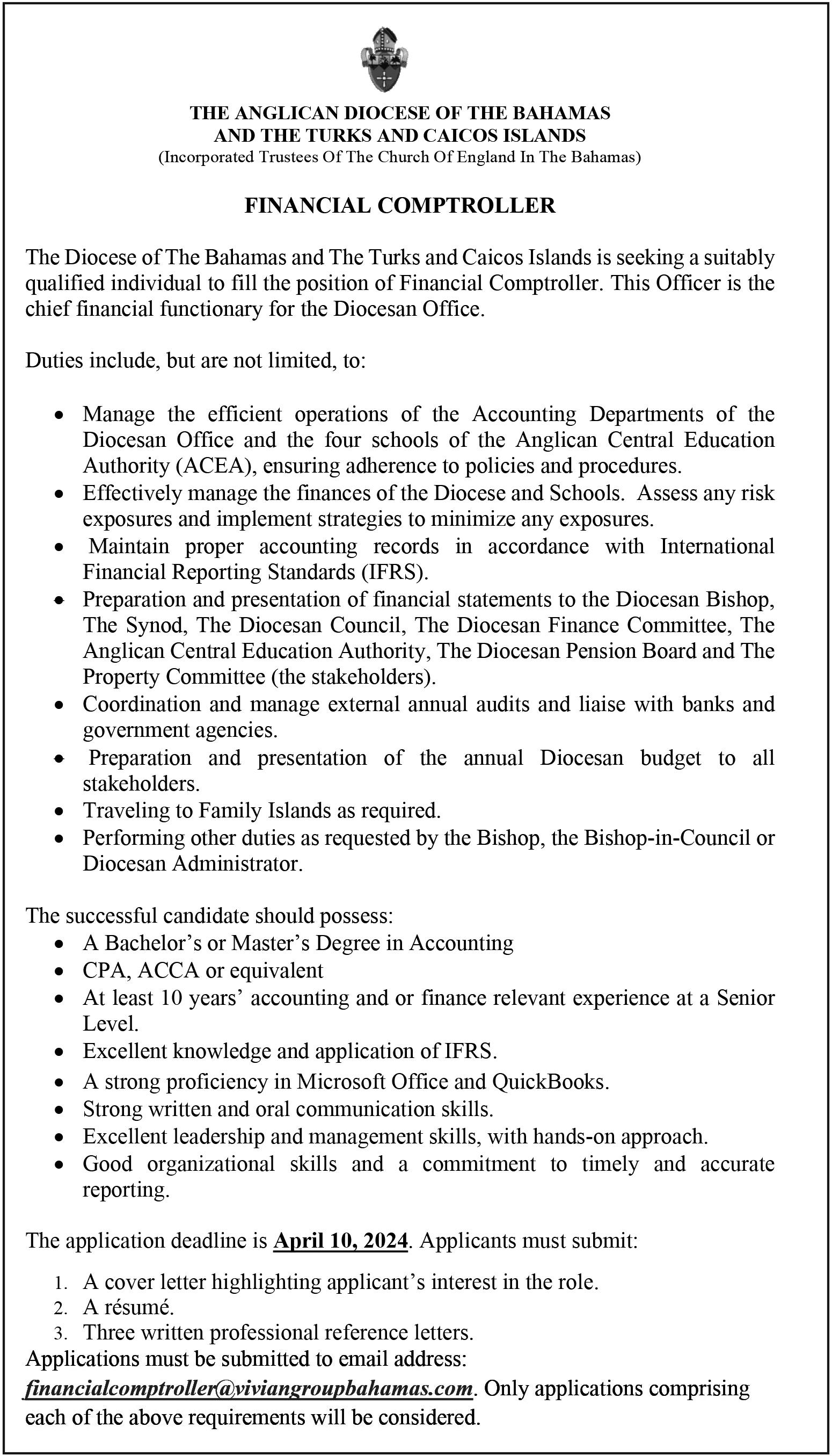
bidders for more time to refine their submissions,” the Energy Committee said.
“This practice is not unusual for us. For example, we previously granted extensions for the Family Island [renewable energy] RFP following similar requests. Our primary objective is to ensure we receive a comprehensive range of proposals for our renewable energy initiatives.
“To address concerns about transparency and fairness, we emphasise that the Go Bonfire platform tracks and logs all interactions with the submitted proposals. As of now, no proposal has been opened or reviewed by the committee. This procedure ensures that all submissions are treated with the utmost integrity and confidentiality until the extended deadline has passed.”
The Energy Committee’s statement, though, did not explain why it seemingly suddenly decided to extend the bid deadline by more than two weeks when, in the answers to bidder queries prior to March 28, it had rejected such action and stuck to the original timeline.
Meanwhile, the RFP itself, a copy of which has been obtained by Tribune Business, reveals that the Government wants bidders to “consider” how majority Bahamian equity ownership of their New Providence solar energy projects can be
achieved within three years. The tender document also stipulates that a “minimum” 40 percent of all profits go to Bahamian shareholders.
“A key project element that is being sought is that of Bahamian ownership,” the New Providence renewable energy RFP states. “In this vein, it is anticipated that the selected respondent’s proposals will be subject to a build, operate and transfer arrangement.
“Additionally, it is important to the Government of The Bahamas that every Bahamian has an opportunity to benefit from implementing these projects. Therefore, consideration must be given to how a minimum of 51 percent Bahamian ownership would be achieved within three years with a minimum of 40 percent of the profit being disbursed to these equity holders.”
The Davis administration made clear that Bahamian ownership will give bidders a distinct advantage, with the bid documents adding: “To avoid doubt, Bahamianowned respondents will receive preference during the RFP scoring process.”
Similar conditions involving Bahamian ownership, profits and the scoring process were included in the ongoing Family Island renewable energy RFP. The Government is targeting five New Providence
“In the circumstances, the Board is unable to reconcile the approval indicating that it was one granting site plan approval without regard to the requirements of section 42 (5) of the Town Planning Act,” the verdict said. As a result, it clarified that Wynn has “preliminary support for site plan approval” - meaning it has passed the “first stage” in the approvals process. It also changed the order of conditions that Wynn must satisfy, placing the DEPP and environment ahead of the Ministry of Works’ civil design unit. “As the approval now stands as a ‘preliminary support for site plan approval’, the second respondent [Wynn] is obliged to seek final site plan approval upon satisfaction of the conditions,” the Appeals Board concluded.
locations for the installation of utility-scale renewable energy facilities, each featuring up to 20 MW of solar, to make up a maximum 100 MW of energy that would be sold to Bahamas Power & Light (BPL) - or whatever entity emerges from the Government’s publicprivate partnership (PPP) reforms - via a 25-year power purchase agreement (PPA).
The five sites are BPL’s Blue Hills power station, CV Bethel High School, the Carmichael Village housing project, Coral Harbour and the Gladstone Road Freight Terminal. Some 108 acres of land is available at the latter location, while the sites at Blue Hills, CV Bethel and Coral Harbour feature 79.2, 90.79 and 93 acres, respectively. Some 90 acres of Carmichael Village’s 206 acres will be available for solar.
“The Government of The Bahamas is focused on fostering a more resilient and sustainable energy future, and is thus inviting proposals for renewable energy projects in New Providence. The total capacity for the projects shall be at a minimum of 60 MW to a maximum of 100 MW,” the Government’s RFP says.
“The Government of The Bahamas and BPL reserve the right to determine the total capacity granted under this RFP. Each project site can have a capacity of up to 20 MW as land space is available. Bahamas Power and Light (BPL) has a 25 MW Battery Energy Storage System (BESS) at the Blue Hills power station.
“One element of the upcoming solar projects is to serve as a renewable energy source for charging these BESS units, which are integral to maintaining the country’s spinning reserves. Furthermore, after charging the BESS, the surplus solar energy will supplement BPL’s base load generation.”

PAGE 4, Thursday, April 4, 2024 THE TRIBUNE
FROM PAGE B1 The Tribune wants to hear from people who are making news in their neighbourhoods. Perhaps you are raising funds for a good cause, campaigning for improvements in the area or have won an award. If so, call us on 322-1986 and share your story. Share your news EMPLOYMENT OPPORTUNITY Ambulatory Medical facility in Freeport is seeking, Qualified and Registered Pharmacist with a minimum of 5 years experience. Contact Human Resource Manager 373-7400 ext. 235 or accounts@lucayanmedical.com
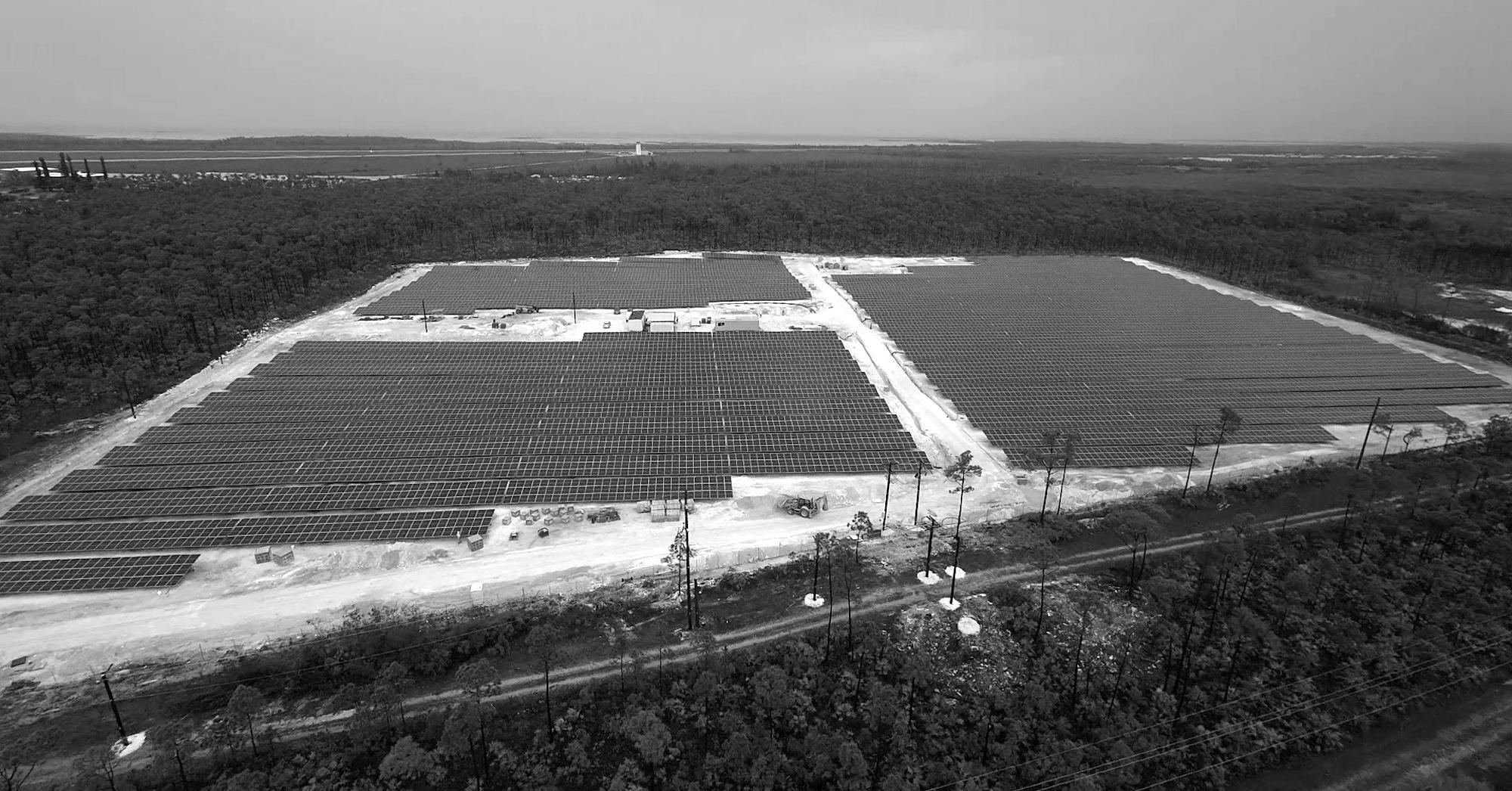
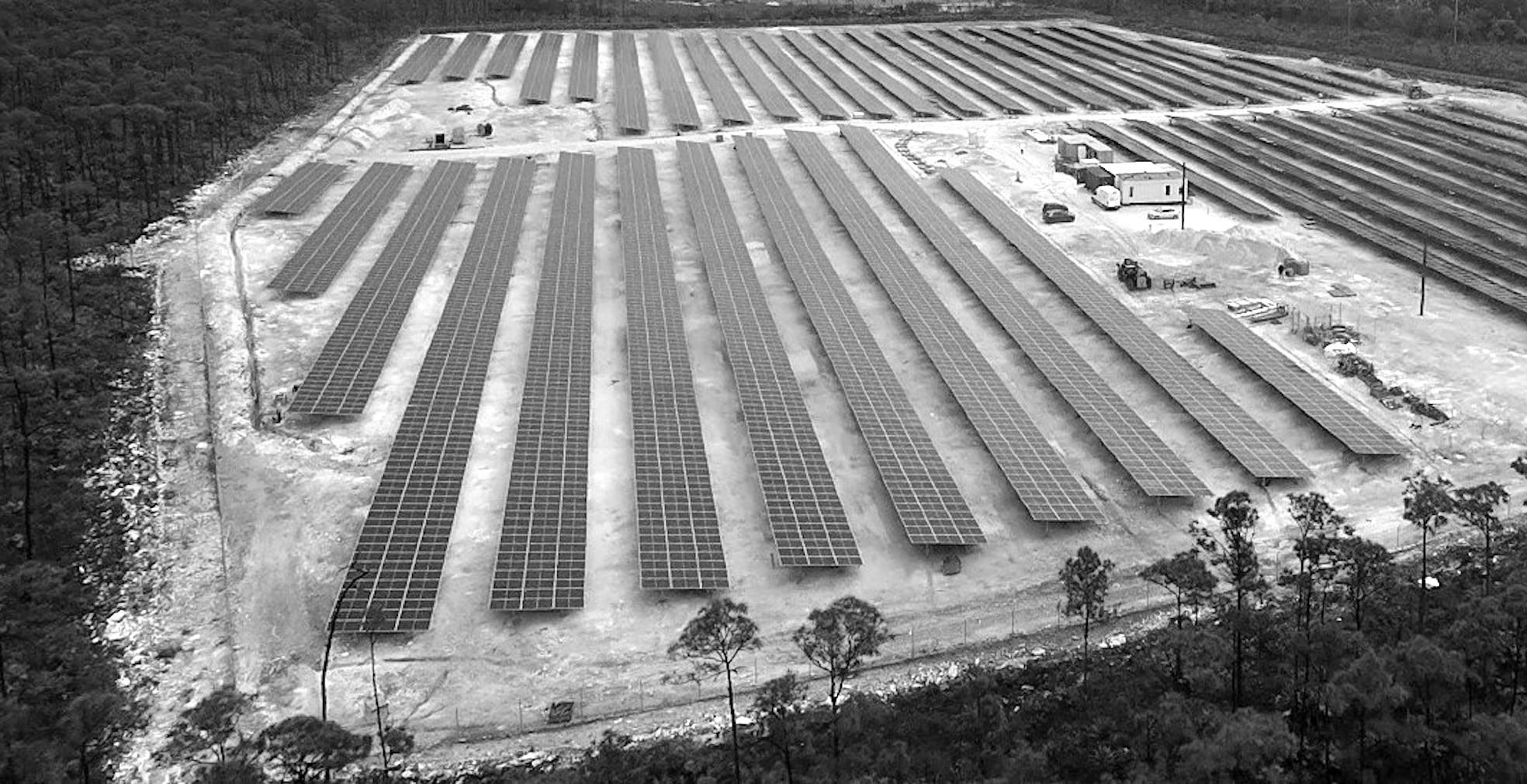
Bahamas approved for $60m ‘blue economy’ credit facility
FROM PAGE B2
Science Institute (BAMSI) and the Bahamas National Trust (BNT). Marine protection initiatives will benefit, in particular, 25,000 inhabitants on Andros and Abaco.
The IDB added that the initiative is structured around three components. The first will promote growth among MSMEs operating in the blue economy, helping them become larger and more efficient by adopting innovations and technology, and facilitating the expansion of
sustainable tourism-related businesses.
The second will develop specialised human capital for the blue economy, in co-ordination with BAMSI. This component will also foster the production of scientific knowledge and its incorporation into industry.
Finally, the third component will enhance the blue economy’s sustainability by financing the implementation and improvement of management plans for existing marine protected areas (MPAs). This component also includes actions to raise community awareness,
scale up coral and mangrove restoration, and collect data for marine species monitoring.
The project, and the first $30m loan, have been approved by the IDB’s Board of executive directors. The credit line consists of two individual and sequential loans over the course of ten years. The first loan of $30m has a 25-year repayment term, a five-and-a-half year grace period, and an interest rate based on the Secured Overnight Financing Rate (SOFR).
Conservation Cove to develop economy, fight climate change
build the blue and green economy tremendously with their groundbreaking innovations utilising science and technology,” added Ellsworth Weir, director of parks, The Bahamas National Trust.
“The Bahamas National Trust is proud to be a partner with the Blue Action Lab and is looking forward to the growth of their biodiversity restoration hub and development of climate solutions that will benefit the Bahamian people and our natural resources, along with those of coastal regions worldwide.”
“Fortifying the resilience of at-risk islands and coastal nations involves developing cutting-edge science and innovative technologies,” Mr Hayward said. “Through the Blue Action Lab’s Conservation Cove, Bahamians will not only be able to protect their way of life, but also access educational programmes and job opportunities that empower them economically and facilitate the sustainable growth of our local communities.
“This isn’t just our base of operations; it’s our home. If we want The Bahamas to have a truly sustainable future we must build
resilient local communities now. If we want to profit from a local blue economy, we must empower and grow the local workforce of the future. We believe Conservation Cove will be key to these efforts.”
“Grand Bahama is perfectly situated to become one of the Caribbean leaders in the creation of novel approaches to aquaculture and eco-tourism, while also building capacity for Bahamian students and community members to own and operate new businesses,” said Megan Davis, research professor and director of the FAU Queen Conch Lab.

GB $15M SOLAR PROJECT IN END-APRIL COMMISSIONING
THE contractor charged with building and operating a $15m utility-scale solar project on Grand Bahama yesterday said the site will be commissioned at endApril 2024.
Inti Corporation, the engineering, procurement and construction (EPC) contractor, in a statement disclosed that the Fairfield site it is developing on behalf of Lucayas Solar Power will be Grand Bahama’s first utility-scale renewable energy project. It has also been contracted to build a second solar facility.
Owen Bethel, Inti Corporation’s chief executive, said: “The commissioning of the Fairfield site is a testament to our team’s dedication and hard work. It reflects our commitment to innovation, sustainability and providing reliable, renewable energy solutions. This is a key step forward in our mission to transition towards a more sustainable future.”
In addition to Fairfield, Mr Bethel said progress is being made at the Devon site. “The Corporation is making significant progress on the Devon solar project site. The site is currently in the advanced stages of development and is expected to further expand Inti Corporation’s capacity to help meet some of Grand Bahama’s energy demands, while also reducing the carbon footprint,” he added.
Both the Fairfield and Devon projects are part of a broader initiative to invest in clean energy technologies that benefit the environment and communities alike.


THE TRIBUNE Thursday, April 4, 2024, PAGE 5
FAIRFIELD SITE
FROM PAGE B3
tourism-related businesses and other ventures due to border closures, travel restrictions and other measures.
“In 2021, it was clear that NIB’s road to recovery would be an uphill lift,” the annual report said. It was also when the results of NIB’s latest actuarial review,
examining its solvency and ability to meet projected future benefit payments to the Bahamian people, revealed that “if no pension reform is implemented the Fund is projected to be depleted in 2028”.
That analysis was conducted in 2018, when NIB had some $1.74bn in reserves and before they were depleted by COVID-19
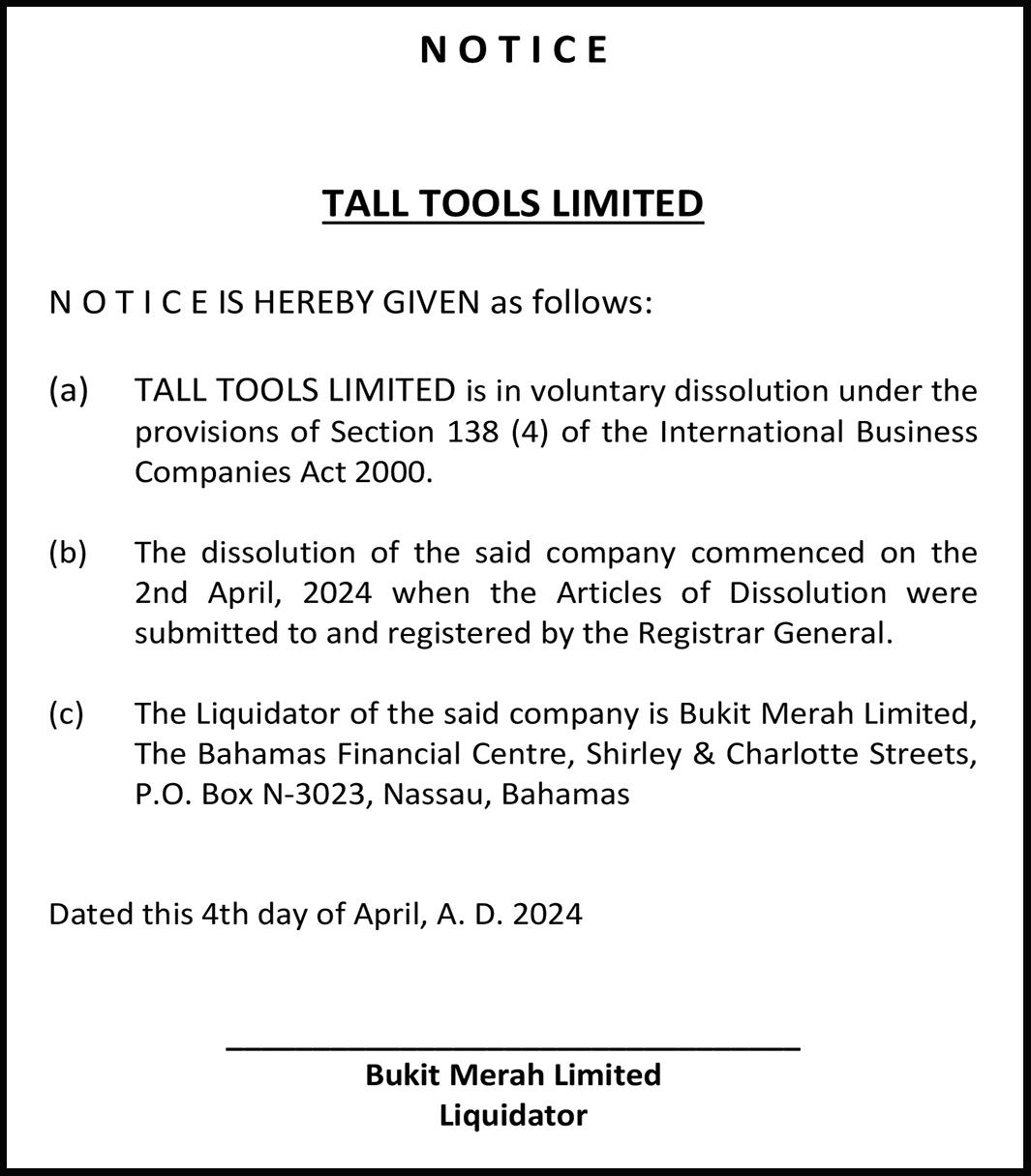
to less than $1.5bn. The pandemic’s financial impact has thus made the need for financial reform at NIB that much urgent and greater, hence the Davis administration’s decision to raise the contribution rate by a total 1.5 percentage points from July 1, 2024.
For pension benefits alone, which increased by 9.2 percent year-over-year in 2021, growing from $258.841m to $282.585m, exceeded both that year’s $260.275m gross, and $257.687m net, NIB contributions by workers, employers and the self-employed.
“Contribution income for the year 2021 grew by $31.7m or 14 percent from $226m in 2020 to $257.7m in 2021,” the NIB annual report said, noting that this
was driven by the economy and tourism’s post-COVID opening. “Benefit expenditure once again exceeded contribution income. However, the deficit for the year declined significantly compared with 2020. Benefit expenditure decreased by $78.4m, or 19.3 percent, from $405.9m in 2020 to $327.5m. The significant reduction was mainly due to high unemployment payments as a result of COVID lockdowns in 2020.
“Unemployment benefit declined by $103.6m or 96 percent from $107.6m to $4m.... The deficit narrowed immensely by $129.1m from $189.5m in 2020 to $60.4m in 2021, reducing total reserves to $1.49bn.”
To meet the increased unemployment and other benefit claims, NIB revealed that its certificate of deposit holdings declined almost 87 percent in 2021, falling from $49.5m to $6.6m to generate sufficient liquidity and cash on hand such that it could meet the increased demands.
“For 2021, the amount paid out through the Government-funded programmes administered by NIB totalled $120m - Dorian unemployment programme, $1.3m; government-funded unemployment assistance programme, $43,200; and government-funded extension programme, $118.5m” the annual report said.

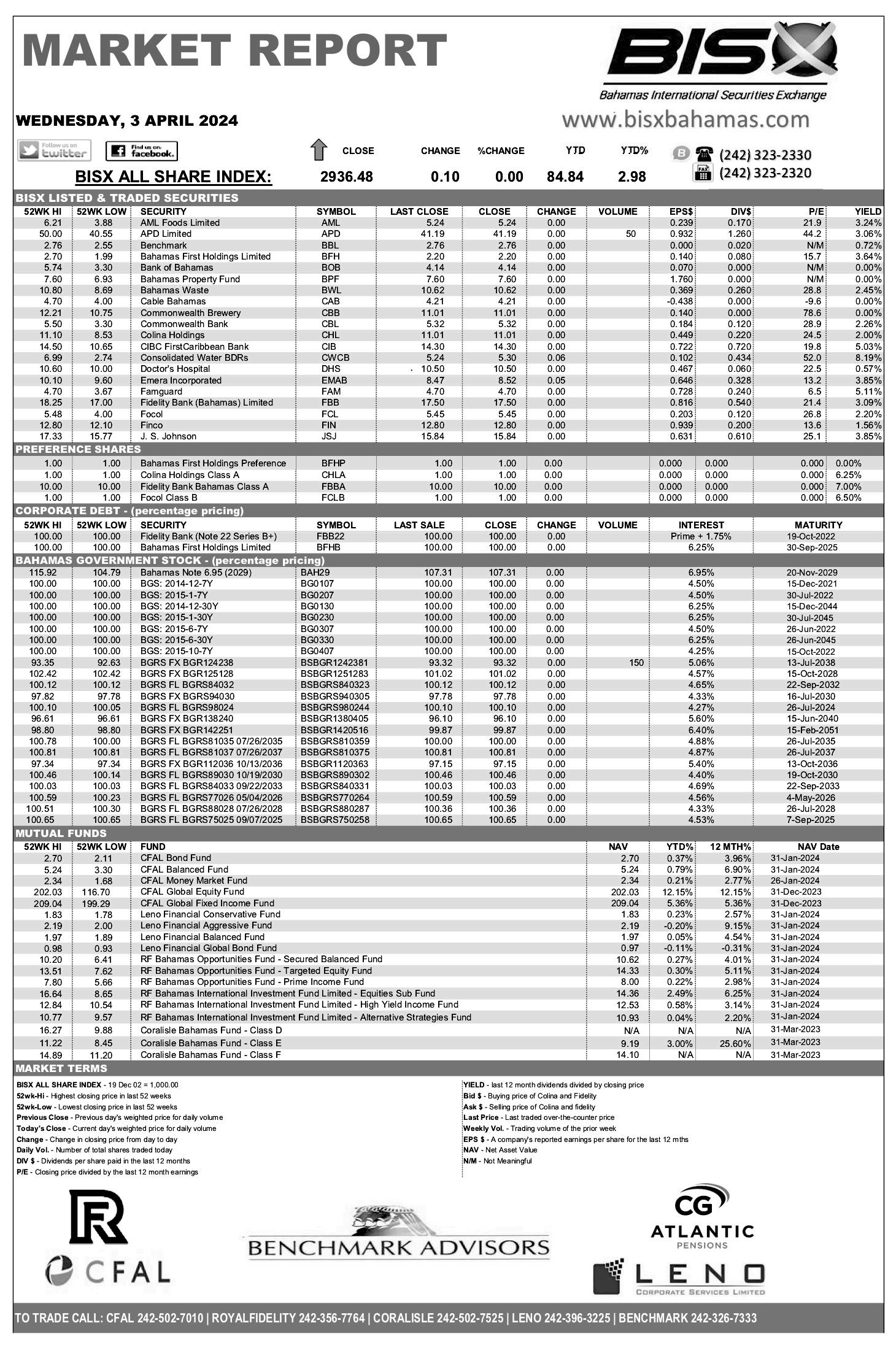
actuarial review, completed in 2001, which forecast that “reserves are projected to become exhausted” by 2029 if comprehensive reforms are not implemented to address the fundamental problem of benefit payouts exceeding contribution income. The recipient of that review, which was only one year out in its depletion estimate, on September 11, 2002, was then-NIB chairman and now-prime minister, Mr Davis. Now, with just four years left to the NIB Fund’s total depletion in 2028, the magnitude of the correction is much more severe for firms and workers still grappling with COVID recovery, the high cost of living, and multiple other challenges.
NIB’s last actuarial report called for a two percentage point increase in contribution rates to be implemented by July 1, 2022, with subsequent further hikes enacted every two years until 2036 to secure the social security system’s long-term financial sustainability. If implemented, that would take NIB’s total contribution rate to 25.8 percent by 2036.
Continuing with its crackdown on delinquent corporate contribution payers, NIB said 363 prosecutions of employers were handled in the Magistrate’s courts in 2021. Of that number, 340 represented new cases approved for prosecution, and $297,477 was collected from payment installment initiatives that financial year.
NIB’s present reality was predicted more than two decades by its seventh
“An increase of the contribution rate by 2 percent (over the existing 9.8 percent) every two years starting on July 1, 2022, and ending on July 1, 2036, could restore the short and medium-term financial sustainability of the scheme,” the last actuarial report said.
“Starting in 2029, the required annual contribution rate to pay for all expenditures becomes the pay-as-you-go (PAYG) rate. As an illustration, the contribution rate will have to increase from 9.8 per cent to 16.9 per cent in 2029, and will reach 32.3 per cent in 2078.”


PAGE 8, Thursday, April 4, 2024 THE TRIBUNE
NIB’s $240m loss
COVID’s
FROM PAGE B1 I.T Position Opportunity Position requirements Include: • 3 years experience in the field along with CompTIA A+ and Network+ certifications • Must have 2 years experience with electronics and Soldering • Must be able to install and trouble-shoot Windows OS and Server 2008/12 • Experience in installing and configuring SQL server • Ability to communicate with end users • Flexible work hours • Ability to resolve problems independently with sound judgment All candidates must submit resumes to sw.employmemt@hotmail.com JOB OPPORTUNITY NOTICE The Public Workers’ Co-operative Credit Union Limited announces that its 44th Annual General Meeting will be held on Friday, May 31st, 2024. The venue and time to be announced. Applications are invited from members in good standing who may wish to run for the following vacant positions: Board of Directors (3 vacancies); Supervisory Committee (2 vacancies) and Credit Committee (2 vacancies). Nominations forms are available at our Nassau and Freeport offices or by emailing sthompson@pwccu.org. Completed Nomination forms, along with a cover letter and resume must be submitted by 4 pm on Monday, May 6th, 2024, either by delivering to any of our offices or via the email listed. No nominations will be allowed from the floor NOTICE INTERNATIONAL BUSINESS COMPANIES ACT, 2000 Stably Digital Opportunities Fund Ltd. (IN VOLUNTARY LIQUIDATION) NOTICE IS HEREBY GIVEN that in accordance with section 138(6) of the International Business Companies Act, 2000, as amended, the winding up and dissolution of Stably Digital Opportunities Fund Ltd. is complete. L. Michael Dean Sole Liquidator Address: Equity Trust House Caves Village West Bay Street P O Box N-10697 Nassau, Bahamas The Public is hereby advised that I, ERIUS ST.MILFORT AKA ERIUS SINMILFORT of P.O Box SP-60553, 4th Street, The Grove, Nassau, The Bahamas intend to change my name to ERIUS HENRIQUEZ. If there are any objections to this change of name by Deed Poll, you may write such objections to the Chief Passport Officer, P.O.Box N-742, Nassau, Bahamas no later than thirty (30) days after the date of publication of this notice. INTENT TO CHANGE NAME BY DEED POLL PUBLIC NOTICE
at
peak

NOTICE





THE TRIBUNE Thursday, April 4, 2024, PAGE 9 NOTICE is hereby given that SILIANE PETITPHAR-PIERRE of Keywest Street, Nassau, The Bahamas applying to the Minister responsible for Nationality and Citizenship, for Registration Naturalization as a citizen of The Bahamas, and that any person who knows any reason why registration/naturalization should not be granted, should send a written and signed statement of the facts within twenty-eight days from the 28th day of March 2024 to the Minister responsible for nationality and Citizenship, P.O. Box N-7147, Nassau, New Providence, The Bahamas. NOTICE NOTICE is hereby given that DANIA ETIENNE JOHNSON of Robinson Road, Nassau, The Bahamas applying to the Minister responsible for Nationality and Citizenship, for Registration Naturalization as a citizen of The Bahamas, and that any person who knows any reason why registration/naturalization should not be granted, should send a written and signed statement of the facts within twenty-eight days from the 28th day of March 2024 to the Minister responsible for nationality and Citizenship, P.O. Box N-7147, Nassau, New Providence, The Bahamas.
NOTICE is hereby given that CENATUS JEAN KENDI of Freeport, Grand Bahama, The Bahamas applying to the Minister responsible for Nationality and Citizenship, for Registration Naturalization as a citizen of The Bahamas, and that any person who knows any reason why registration/naturalization should not be granted, should send a written and signed statement of the facts within twenty-eight days from the 28th day of March 2024 to the Minister responsible for nationality and Citizenship, P.O. Box N-7147, Nassau, New Providence, The Bahamas.
NOTICE is hereby given that FREDDY TAPIA GUILLEN of Apartment #52 Unit #4, Sapphire Ridge, Nassau, The Bahamas applying to the Minister responsible for Nationality and Citizenship, for Registration Naturalization as a citizen of The Bahamas, and that any person who knows any reason why registration/naturalization should not be granted, should send a written and signed statement of the facts within twenty-eight days from the 4th day of April 2024 to the Minister responsible for nationality and Citizenship, P.O. Box N-7147, Nassau, New Providence, The Bahamas.
NOTICE
NOTICE
PI Crown Land battle’s Privy Council appeal
on western Paradise Island in the vicinity of Colonial Beach. “We filed with the Court of Appeal to get leave to go to the Privy Council,” Mr Smith said. “I think it’s of great public interest, and I’m obviously hoping that the Privy Council rules in our favour and upholds the offer of the lease. “I think Sir Michael Barnett has really supported our case very succinctly and precisely. I have every confidence we will succeed.” Sir Michael, the court’s president, in his March 14, 2024, verdict ruled that he would order “specific performance of the lease” by the Government as Mr Smith had “a binding agreement” to lease the five Crown Land acres for a beach break-type destination.
He also found that the then-Minnis administration did not sign the agreement with Mr Smith because it “determined that it had found a better deal”namely Royal Caribbean Cruise Lines’ Royal Beach Club project, which itself wanted to lease three of the same acres sought by the Bahamian entrepreneur.
However, Sir Michael’s dissenting verdict did not prove decisive, as his two fellow justices on the threestrong Court of Appeal panel rendered the majority decision in favour of the Government by finding the reverse - that no valid, legally binding lease agreement was in place.
Appeal justices Gregory Smith and Michael Turner upheld the original Supreme Court verdict by Sir Ian Winder and said they saw no reason to overrule, or interfere with, the Chief Justice’s analysis of the case or his legal conclusions.
Donovan Gibson, the Munroe & Associates attorney who is a member of Mr Smith’s legal team, asserted in legal documents filed with the Court of Appeal yesterday that “we believe that the appellant has an arguable
appeal and the prospects of success are good. “We also believe that the appellant’s [Mr Smith’s] appeal is one of general and public importance as it is not frivolous, vexatious or abusive, and which ought to be submitted to the Judicial Committee of the Privy Council,” he added.
Mr Smith’s lead counsel has been former minister of state for legal affairs, Damian Gomez KC. The Bahamian entrepreneur’s filings set out nine grounds of appeal. Besides arguing that appeal justices Smith and Turner were incorrect in their decision, Mr Smith is asserting that the real issue is whether a January 7, 2020, from Richard Hardy, then-acting director of the Department of Lands and Surveys, which contained the lease, “evidenced a binding agreement”. He added that the Court of Appeal majority “asked themselves the wrong question” by focusing on whether the lease was “a valid agreement” in the absence of the signature of Dr Hubert Minnis, then minister responsible for Crown Lands. “The real question was whether the essential terms of an agreement for lease were present,” Mr Smith’s filings added. “Had the learned justices of appeal not so misdirected themselves, they would have held, as Sir Michael Barnett did, that all the essential terms of an agreement for lease were present, there was nothing further to be negotiated or agreed, and that all that remained was for the respondent [the Attorney General and the Government] to sign and seal the lease as per the agreement.”
The Bahamian entrepreneur’s filings also argued that if there was an “agreement for lease” then it was “irrelevant that the minister had not signed the lease”, while the Court of Appeal majority was also purportedly wrong to find that “the Government could not be bound by the actions of its alleged ‘agents’.”
The Davis administration previously requested that Toby Smith “reapply” for the necessary government permits and approvals so that his project can proceed after he lost the original Supreme Court case. Little is likely to change in this regard until it is known whether the Privy Council will hear his appeal.
Appeal justice Smith, writing the majority verdict, said the dispute centred on a 21-year lease that the then-Minnis administration allegedly granted Mr Smith for the use of two Crown Land parcels - one two acres in size, the other three - on the western end of Paradise Island in the Colonial Beach area.
Noting that the initial application was made more than a decade ago in 2012, appeal justice Smith added that some six years later the Bahamas Investment Authority (BIA), via a May 23, 2018, letter informed Mr Smith that his $2m beach club project had been approved. However, rather than the 17 acres initially sought, the Crown Land lease was to cover just five.
Then, on January 7, 2020, Richard Hardy, acting director of the Department of Lands and Surveys, sent Mr Smith and his company a letter headlined “approval for Crown Land lease”. This covered a two and threeacre parcel, respectively, with the first adjacent to the lighthouse at Paradise Island’s western end and the other for the ‘beach break’ destination.
The letter contained instructions on how the attached lease documents were to be signed, dated, sealed and notarised, then returned to the Department of Lands and Surveys. Once the minister responsible for Crown Lands, who was then-prime minister Dr Hubert Minnis, signed a copy of the lease was to be returned to Mr Smith.
The Bahamian entrepreneur signed the lease forwarded by Mr Hardy, and returned it to the Government for execution two days
later on January 9, 2020. Dr Minnis, though, did not sign the lease on the Government’s behalf as it emerged that Royal Caribbean had rival designs on the threeacre Crown Land parcel for its own Royal Beach Club project.
Sir Michael, though, disagreed and said he would have ordered “specific performance of the lease” by the Government. Describing Mr Hardy’s letter as being of “major importance”, the Court of Appeal president
said the letter was headlined “approval for Crown lease” and did not say or suggest there were any matters left to be agreed between the parties. “In my judgment, the critical question in this appeal is whether the letter of January 2020 evidenced a binding agreement between the appellant and the minister for the lease of five acres of land on Paradise Island,”
Sir Michael wrote. “The Chief Justice formed the
no concluded agreement. The lease sent on January 7, 2020, had been prepared by the respondent’s [Attorney General’s] lawyers on the respondent’s instructions. There was nothing further to be negotiated and agreed.... “The document reflecting the terms of the agreement was sent by the respondent to the appellant for signature. All that was left was for the respondent to sign and seal the lease. He did not do so because the Government determined that it had found a better deal.”


THE TRIBUNE Thursday, April 4, 2024, PAGE 11
view that there was no concluded agreement. “It is difficult to see how it can be said that there was
FROM PAGE B1
Gov’t and Opposition fight on GDP growth
2023 when presenting the 2023-2024 mid-year Budget at end-February. And he asserted that the Government had deliberately ignored, and failed to address, the fact that its own Budget projections had cut forecast economic growth for the present 2023-2024 fiscal year by 80 percent in just nine months - slashing it from 5.5 percent in May 2023 to just 1.1 percent at the mid-year.
The Ministry of Finance, talking up the figures, said: “The estimates were very
encouraging with nominal GDP increasing by 9.2 percent and real GDP increasing by 2.6 percent. The nominal growth was more than twice the Government’s mid-year projection for fiscal year 2023-2024 of 3.7 percent, and the real projection was more than twice the Government’s mid-year real projection for fiscal year 2023-2024 of 1.1 percent.... “The medium term and long-term growth prospects for The Bahamas are very encouraging, and the preliminary GDP results of 2023 provide this
confirmation. A 2.6 percent real growth is almost double the country’s recent average real growth excluding the post-pandemic adjustment. As prices continue to normalise globally, the retail and utility sector would grow, and strong real GDP growth would continue.”
The release, though, seemed to misrepresent a Tribune Business interview with Hubert Edwards, head of the Organisation for Responsible Governance’s (ORG) economic development committee, by suggesting he said the 2.6 percent real GDP growth
rate “should be viewed as a sign of potential trouble in the future given that it is below previous estimates provided by the IMF”. Mr Edwards, in fact, said The Bahamas needs to focus more on its medium and long-term economic goals rather than have a myopic concentration on short-term annual outcomes. He acknowledged that the 2.6 percent real GDP figure signalled “the economy grew a little bit slower” than expected, but told this newspaper that it still represented a rate


slightly higher than the country’s annual average.
“That tells you there is some momentum being created in the economy in terms of the consolidation and kind of correction from Dorian and COVID,” Mr Edwards said. “That’s a positive. The question going forward is always going to be how we move this from 2.6 percent to 3 percent or 3.5 percent consistently.”
“For The Bahamas, according to the BNSI, the economic expansion which the country is currently experiencing is driven by strong tourism and construction activity supported by foreign direct investment and an improved domestic economy,” the Ministry of Finance added.
“The domestic economy has strengthened because of a deliberate strategy of the Government to stabilise the public finances. Service exports, which are mainly tourism related, grew by $200m and real construction activity grew by 22 percent.
“The areas where real growth was stunted were in the utilities sector and the retail sector. Given the spike in fuel prices last year and its impact on energy costs, this was expected and should be viewed as a one-off event with no lasting effect on the country’s growth trajectory,” it continued.
“Finally, the 2023 preliminary GDP results demonstrate that the Government’s growth strategy of stimulating the economy through encouraging foreign direct investment, stabilising public finances, and making strategic investments in the health and social sector is clearly working. The Government is confident that this strategy would lead to acceleration of economic growth over the medium term.”
Mr Pintard, not surprisingly, had a much different interpretation as he blasted the Ministry of Finance’s statement as “a sad and desperate attempt at spin” that sought to mask the fact 2023’s economic growth had underperformed the IMF’s 4.3 percent projection by 40 percent in percentage terms.
“No less than the Prime Minister himself a few weeks ago, in late February 2024, said that he expected the economy to grow in real terms by 4.3 percent last year only to find that the growth only reached 2.6 percent,” the Opposition’s leader blasted.
“Even at the mid-term Budget report, when the Prime Minister failed to publicly acknowledge that they were forced to drop the economic growth forecast for this fiscal year by 80 percent - from 5.5 percent to 1.1 percent - this reckless PLP government still did not come with a plan to rein
in spending and to boost the economic prospects.
“They’ve only recently admitted this drop in economic forecasts to 1.1 percent after trying to hide it on purpose until Opposition parliamentarians brought it up in the House. We must also ask the question: If the Minister of Finance had already adjusted the fiscal year forecast to 1.1 percent in the actual mid-year report, why was he still claiming in his mid-year Budget statement that he expected 4.3 percent growth in 2023?”
The fiscal year, though, runs from July to June the following year, whereas the IMF’s 4.3 percent forecast was based on the calendar year, so it is not a direct comparison. Mr Pintard, though, warned that the missed growth forecasts will lead to higher fiscal deficits and an increased national debt, as well as “worsen the burdens on already-struggling Bahamian families”. Tribune Business reported last week that the initial GDP growth estimates for 2023 unveiled by the Institute came in under both International Monetary Fund (IMF) and Central Bank of The Bahamas forecasts.
The Fund, in its late November 2023 statement on the latest Article IV consultation with The Bahamas, projected that real GDP - a measure of total economic output that strips out inflation’s impact - would be around 4.3 percent last year as the economy completed its recovery from the COVID19 pandemic.
And John Rolle, the Central Bank’s governor, said as recently as late January: “In 2023, it is estimated that the economy grew in the 4 percent range, which is a levelling off from the significant post-pandemic recovery of around 14 percent in 2022.
“This captured a very robust boost in the cruise sector’s contribution, a completion of the occupancy recovery in the stopover sector, and healthy appreciation in the average pricing for stopover accommodations, among both hotels and vacation rental properties. In 2024, the growth is expected to be within the low 2 percent range, still moderately above the estimate of the economy’s medium-term potential.”
However, according to the Statistical Institute, real GDP growth in 2023 was just 2.6 percent - an outcome that was around $200m lower than both the Central Bank and IMF had forecast. Still, that growth rate represented a $330m expansion in Bahamian economic output to $12.831bn, which pushed this nation beyond the preCOVID GDP record of $12.616bn set in 2018.


PAGE 12, Thursday, April 4, 2024 THE TRIBUNE
FROM PAGE B1




































